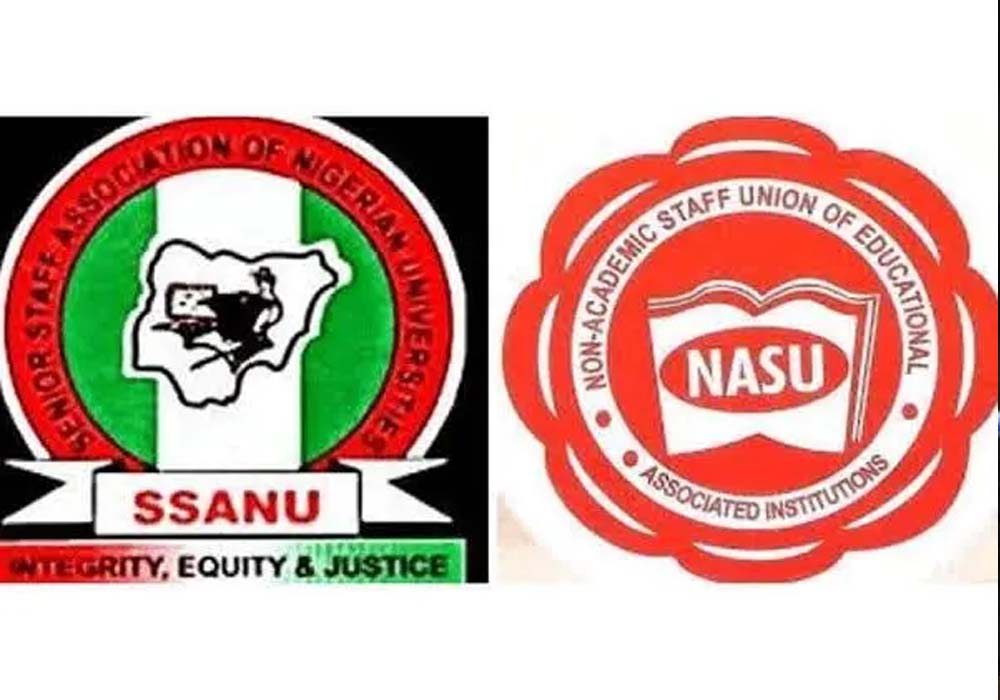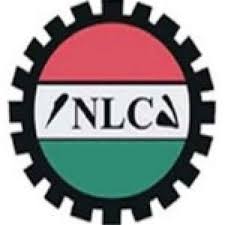NEWS
Finally, SSANU, NASU suspend strike effective Wednesday

The Joint Action Committee,(JAC), of the Non Academic Staff Union of Education and Associated Institutions, NASU, and Senior Staff Association of Nigerian Universities, SSANU, said it would suspend its ongoing strike on Wednesday.
The JAC’s spokesman, Mr Peters Adeyemi, said this in a statement made available to newsmen on Saturday in Abuja.
The News Agency of Nigeria(NAN) reports that the unions had embarked on strike since March 27, to press home their demands.
The workers’ demands include renegotiation of 2009 agreements with the Federal Government; inconsistencies occasioned by IPPIS, and replacement of the payment platform with the University Peculiar Personnel Payroll System (U3PS), and non-payment of earned allowances.
Others are payment of arrears of national minimum wage; release of whitepapers on visitation panel reports.
Others are reinstatement of staff schools’ teachers in line with the National Industrial Court judgement; poor funding and governance of state universities, among others.
Adeyemi said the the decision to to suspend the strike was taken following negotiation between the unions and the Federal Government team led by the Minister of Education, Malam Adamu Adamu.
According to him, the suspension of the strike was for the initial two months to allow government implement the agreements reached.
“Part of the agreement is the decision of the government to set aside the sum of N50 billion for the payment of earned academic and earned allowances, cogent decision on the University Peculiar Personnel Payroll System (U3PS).
”Release of the whitepaper on university visitation panel and funding of the universities.
”On the poor funding of federal institutions, the Minister directed the National Universities Commission (NUC), to ensure that all the schools are up-to-date on what they are supposed to do.
”Otherwise sanctions will be visited on any institution that defaults.
“The Minister of Education also gave an assurance that no member of the unions that participated in the strike will be victimised,” he said.
Adeyemi also added that the minister said President Muhammadu Buhari was committed to devoting 15 per cent of the national budget to education.
He said, ”on the salary payment system, the minister said the alternative payment systems provided by ASUU, JAC of NASU and SSANU did very well.
”The minister also said the Federal Government was awaiting the report of the technical committee it set up before taking action on the matter.
”After prolonged negotiations and dialogue between the two unions and the Federal Government led Adamu and after the meeting, the two unions decided to suspend the strike for the initial period of two months.
READ ALSO: ASUU: Disregard resumption notice, LAUTECH management tells students
“When we presented the offers that the government made to our members, they think that since the majority of the issues that are in contention have been substantially addressed by the government, the strike is hereby suspended effective on Aug. 24,” he said.
Similarly, SSANU in a statement signed by its President, Mr Mohammed Ibrahim, said the meeting between the government and the unions was satisfactory.
Ibrahim said, ”today, having satisfied ourselves that government, this time around has committed itself to agreeing to respect the agreements that have been reached at the meetings.
“‘We believe that it is only honourable that we give the government the benefit of the doubt, while the needful was being done at the government’s end.
“To this end, we hereby inform you of a two months window given to the government to actualize the agreements that have been reached.
”The two months window is in the nature of a ceasefire and does not represent a closure on the industrial action.
“It is our sincere prayer, given the assurance made by the Minister of Education and our commitment to ensure an end to the ongoing impasse.
”That the two months opportunity will suffice for actions to be taken and the entire matter laid to rest.
“In view of the above, NASU and SSANU members are hereby directed to resume duties on Wednesday, Aug. 24, ‘he said.
NEWS
Ibadan Funfair Tragedy: Former Ooni’s Wife, Others Remanded Over Stampede

A Chief Magistrate’s Court in Iyaganku, Ibadan, has ordered the remand of Naomi Silekunola, the former wife of the Ooni of Ife, along with Oriyomi Hamzat, the CEO of Agidigbo FM, and Abdullahi Fasasi, the Principal of Islamic High School, at the Agodi Correctional Centre.
The trio was arraigned on Tuesday in connection with the recent tragic stampede that occurred during a Christmas funfair at Islamic High School, Bashorun, Ibadan.
The incident, which claimed the lives of 35 children and injured six others, has drawn widespread public and legal attention.
Presiding over the case, Chief Magistrate Olabisi Ogunkanmi issued the remand order following charges brought against the defendants. The police prosecutor stated that their alleged offences contravened Section 324 of the Criminal Code, Cap. 38, Vol. II, Laws of Oyo State, 2000.
READ MORE: States Tighten Measures To Prevent Stampedes At Events
The prosecution accused the defendants of being involved in the organization of the event, which turned disastrous, leading to the stampede. Pending legal advice from the Oyo State Director of Public Prosecutions, the court directed their detention at the correctional facility.
The court session, held amidst heavy security, attracted significant public interest. Law enforcement officers were seen providing tight security as the suspects were escorted to and from the courtroom.
Further updates on the legal proceedings are expected as investigations continue.
NEWS
Labour Kicks Against N935/Litre Petrol, Wants More

A cry has gone out for further reduction of the pump prices of premium motor spirit (PMS) in Nigeria to reflect local domestic production of refined products.
The Nigeria Labour Congress (NLC)has urged further reduction in the pump price of Premium Motor Spirit (PMS) otherwise known as petrol, insisting that the recent drop in price to N935/litre was begging the situation.
Recall that the Dangote Petroleum Refinery in partnership with MRS recently announced a reduction in petrol price to N935/litre.
Before the announcement, the commodity sold for over N1,030/litre in Lagos and environs, while it cost more than N1,060/litre in Abuja and Northern states.
ALSO READ: CSOs Urge Further Reduction Of Pump Prices Of Petrol
In a swift reaction, on Sunday, the Independent Petroleum Marketers Association of Nigeria (IPMAN) said its members would be selling petrol at N935/litre from Monday based on the latest arrangement with the Dangote Petroleum Refinery.
IPMAN’s National President, Maigandi Garima,, according The Punch, said the reduction in Dangote refinery’s ex-depot price for petrol and the uniform arrangement being put in place, would enable marketers to sell at N935 in their outlets nationwide.
They had set aside N36/litre as cost of logistics.
However, the announcement did not excite the NLC, which insisted on Monday that the cost of petrol should drop further.
A senior official of the NLC, Chris Onyeka, unequivocally rejected any commendation for the Federal Government and the Nigerian National Petroleum Company Limited (NNPC Ltd) over the recent reduction in the pump price of petrol.
He argued that the current pricing mechanism does not reflect the true cost of the commodity, according to The Punch.
“Do you want us to clap for them? How can we be okay with a price of N935/litre of PMS? This is not the right price for PMS. You cannot base the price on imported products when we have refining capacity in Nigeria,” he said.
He argued that the costs embedded in the current pricing framework — including foreign labour, freight charges, insurance, logistics, and profits accrued abroad — unfairly burden Nigerians.
“Products are refined in Nigeria, yet the price you give Nigerians is based on imported products. Why should we applaud that? It is akin to someone stealing your money and returning only part of it, then expecting you to clap. We cannot applaud this,” he stated.
Onyeka stressed that the only way to ascertain the correct price of PMS is by determining the actual cost of refining it domestically.
“We need to know how much it costs the NNPC to refine a litre of PMS in our local refineries, such as the Port Harcourt refinery. That is the price Nigerians should be paying,” he emphasised.
He called on the government to prioritise the welfare of Nigerians by ensuring that fuel pricing aligns with local realities.
“This country belongs to all Nigerians. Let the government do the right thing that allows Nigerians to breathe. Let the poor breathe.
“The NLC’s position underscores growing discontent among Nigerians over the rising cost of living, with fuel prices being a major contributor to inflation and economic hardship,” he stated.
NEWS
No Regrets On Subsidy Removal, Tax Reforms To Continue – Tinubu

President Bola Tinubu, during his first Presidential Media Chat aired on the Nigerian Television Authority on Monday, reaffirmed his administration’s commitment to the ongoing tax reforms and subsidy removal, maintaining that the measures are essential to securing Nigeria’s economic future.
The tax reforms, designed to eliminate colonial-era practices and widen the tax net, have faced significant resistance from some quarters, particularly from northern lawmakers and governors. Despite this, Tinubu declared, “Tax reform is here to stay. We cannot just continue to do what we were doing yesteryears in today’s economy.”
The reforms, encapsulated in four bills transmitted to the National Assembly, aim to streamline taxation and revenue generation.
However, critics, including Borno State Governor, Babagana Zulum, have argued for caution. “The Petroleum Industry Bill took almost 20 years before it was finally passed. This tax reform bill is being transmitted and receiving legislative attention within a week. It should be treated carefully and with caution,” Zulum said in an interview with BBC.
Despite calls for broader consultations and delays, Tinubu emphasized the pro-poor nature of the reforms, noting that the vulnerable would not be taxed. “The essence of the tax reform is to eliminate colonial-based assumptions in our tax environment,” he stated.
READ MORE: President Tinubu Set For First Nationwide Media Chat Tonight
No Regrets Over Subsidy Removal
Addressing the economic hardship resulting from the removal of the petrol subsidy, Tinubu defended his decision as necessary to prevent Nigeria from “spending its future.” He dismissed the notion of a phased removal, stating, “Phased removal is part of unnecessary fear. No matter how you cut it, you still have to meet the bills.”
The President highlighted the benefits of subsidy removal, pointing out that the policy had curtailed smuggling and freed up resources for more productive uses. “There is no way that you give out fuel and allow all the neighbouring countries as Father Christmas. I don’t have any regret whatsoever in removing the subsidy,” he said.
Tackling Inflation and Corruption
Tinubu also discussed his administration’s strategies to reduce inflation, emphasizing local production and import reduction. “If one produces more for consumption locally, stop imports, give a reasonable level of funding and assistance… we have what it takes,” he explained.
On corruption, the President cited increased earnings for workers and stricter oversight by anti-corruption agencies as key measures. He pointed to the recent seizure of hundreds of properties reportedly owned by a former Central Bank Governor as evidence of his administration’s efforts. “Part of the anti-corruption is removal of subsidy. It is very difficult to eliminate but you reduce it to the barest minimum,” Tinubu stated.
Food Stampedes and Governance
The President expressed condolences over recent tragic stampedes during food distribution events, attributing the incidents to poor organization by event planners. “If you don’t have enough to give, don’t attempt to give or publicize it,” he warned.
Tinubu concluded by reaffirming his commitment to efficient governance and economic reforms, stating, “The hallmark of a good leader is the ability to do what you have to do at the time it has to be done.”
The reforms continue to spark nationwide debates, with stakeholders divided over their potential long-term impacts.















